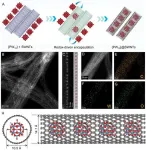(Press-News.org) A new study that sheds light on how B cells react to skin cancer cells could pave the way for innovative therapy design.
The study, published today in Nature Communications and led by researchers from King’s College London, reveals that antibody-producing B cells in patients may be defective in responding to the most aggressive skin cancer, melanoma.
Antibodies are produced by B cells, a type of white blood cell, and are made to prevent and help fight infections. However, there is limited understanding about how B cells are prompted to respond to melanoma and why the antibodies they make are not effective.
Researchers used advanced technologies to delve into the intricate workings of the antibody immune response in blood and tissues of patients with metastatic cutaneous melanoma. The blood of patients with late-stage secondary melanoma shows significantly lower levels of mature (memory) B cells, which normally provide long-term protection from infections. This means that the antibody-producing B cells in the blood may be less able to mount effective responses against cancer.
The research also finds that active B cells accumulate at the edge of the tumour and gather in small groups. These B cells carry specific antibody features and react to melanoma by assembling and communicating with each other, and with another immune cell type known as T cells.
In those melanoma lesions where B cells express specific antibody isotypes, such as IgG which better activates the immune system, the presence of B cells is associated with more favourable patient survival.
The research also finds that B cells in patients with metastatic melanoma also make antibodies which have similar functions to pathogenic antibodies seen in autoimmune diseases, such as the recognition of normal non-cancerous cells. These characteristics may prevent the immune system from mounting a strong response to clear melanoma.
First author Dr Silvia Crescioli, from King's College London, said: "Our research provides a new perspective on the aberrant nature of B cell phenotypes, antibody characteristics and what they recognise in metastatic cutaneous melanoma. By uncovering autoimmune signatures and the highly active, yet abnormal, B cell response in the tumour microenvironment, we open doors to specific treatment advancements."
Dr Joseph Ng, from University College London, co-author of the study said: 'Through analysing large datasets of B cell and antibody profiles found in melanoma, we can gather in-depth knowledge of the types of responses that may offer anti-tumour benefit, and this could provide clues for the development of novel treatments”.
Lead author Professor Sophia Karagiannis from King's College London, said: “The findings of this study offer a deeper understanding of the intricate immune response deficits involved in metastatic cutaneous melanoma and their potential clinical significance. We are studying B cell signatures in different and larger cohorts of patients to better understand how these deficient antibody responses we have uncovered may be linked to patient outcomes. We are conducting extended research to elucidate how B cells interact with cancer cells and to dissect the conditions that initiate and enhance effective B cell and antibody responses. Together, these will offer opportunities for innovative therapy design in future”.
The study was conducted in close collaboration with Dr Franca Fraternali at University College London, Dr Sophia Tsoka at the Department of Informatics, Faculty of Natural, Mathematical and Engineering Sciences, colleagues across the Faculty of Life Sciences & Medicine, King’s College London, Mount Sinai Hospital, Toronto, Canada, University of Surrey and with clinical colleagues at St John's Institute of Dermatology, Guy’s and St Thomas’ NHS Foundation Trust and the NIHR Biomedical Research Centre.
END
Study uncovers how B cells react to skin cancer
2023-06-08
ELSE PRESS RELEASES FROM THIS DATE:
Universities in California, Arizona, and Nevada form consortium to address clean water access and sustainability challenges
2023-06-08
A novel collaboration between the University of Southern California (USC), the University of Arizona (UA), and the University of Nevada, Reno (UNR), has resulted in the Water Reuse Consortium. This groundbreaking partnership has been awarded a $12.3 million cooperative agreement for phase one of a three-phase $38 million program with ERDC-CERL to tackle pressing water challenges through innovative research, education, communication, and unprecedented collaborative efforts between government, local communities, industry, and academia.
The Water Reuse Consortium brings together ...
Henry Ford Health researchers launch clinical trial studying therapy aimed at causing brain cancer cells to self-destruct
2023-06-08
DETROIT (June 8, 2023) – Researchers in the Hermelin Brain Tumor Center at Henry Ford Health are leading a Phase I clinical trial studying the maximum tolerated dose of an oncolytic adenovirus, a mutated virus engineered to selectively replicate in and destroy cancer tissue, in combination with fractionated stereotactic radiosurgery among patients who are undergoing resection of a recurrent high-grade astrocytoma brain tumor.
“The participants in this study have progressive high-grade astrocytoma as well as glioblastoma, and are scheduled to undergo repeat surgery,” said Tobias ...
Resuscitation after on-field cardiac arrest should start with teammates
2023-06-08
It is well known that early resuscitation with cardiopulmonary resuscitation (CPR) and an automated external defibrillator (AED) saves lives, and in most sports-related sudden cardiac arrest events, trainers or medical personnel respond and initiate protocols to resuscitate a player while other athletes standby. However, time to treatment is critical, so the ability for a fellow athlete to recognize sports-related sudden cardiac arrest and initiate resuscitation while medical personnel arrive is crucial in a life-threatening event where seconds matter. However, in a new study presented at the American ...
Place of death from cancer in US states with vs without palliative care laws
2023-06-08
About The Study: The results of this study suggest that state palliative care laws are associated with an increase in the likelihood of dying at home or in hospice among decedents from cancer. Passage of state palliative care legislation may be an effective policy intervention to increase the number of seriously ill patients who experience their death in such locations.
Authors: May Hua, M.D, M.S., of the Columbia University College of Physicians and Surgeons in New York, is the corresponding author.
To access the embargoed study: Visit our For ...
Projected health outcomes associated with Supreme Court decisions in 2022 on COVID-19 workplace protections, handgun-carry restrictions, and abortion rights
2023-06-08
About The Study: The findings of this study suggest that outcomes from Supreme Court decisions in 2022 that invalidated COVID-19 workplace protections, voided state laws on handgun-carry restrictions, and revoked the constitutional right to abortion could lead to substantial harms to public health, including nearly 3,000 excess deaths (and possibly many more) over a decade.
Authors: Adam Gaffney, M.D., M.P.H., of Harvard Medical School in Boston, is the corresponding author.
To access the embargoed study: Visit our For The Media website at this ...
Accuracy of AI in estimating best-corrected visual acuity from fundus photographs in eyes with diabetic macular edema
2023-06-08
About The Study: The results of this investigation suggest artificial intelligence (AI) can estimate best-corrected visual acuity directly from fundus photographs in patients with diabetic macular edema, without refraction or subjective visual acuity measurements, often within one to two lines on an Early Treatment Diabetic Retinopathy Study chart, supporting this AI concept if additional improvements in estimates can be achieved.
Authors: Neil M. Bressler, M.D., of the Johns Hopkins University School of Medicine in Baltimore, and Editor, JAMA Ophthalmology, is the corresponding author.
To access the ...
Scientists map complete genome of millet
2023-06-08
An international team of researchers has unlocked a large-scale genomic analysis of Setaria or foxtail millet, an important cereal crop. The study, led by researchers at the Chinese Academy of Agricultural Sciences and including scientists at NYU, advances our understanding of the domestication and evolution of foxtail millet, as well as the genetic basis for important agricultural traits.
“Foxtail millet is considered to be the foundation for early Chinese civilization,” said Michael Purugganan, the ...
Improving market design for energy storage
2023-06-08
New York, NY—June 8, 2023—Energy storage plays a crucial role in our transition to cleaner and more sustainable energy sources. It enables us to store excess energy when it’s available, from renewable sources like wind and solar, and use it when demand is high or supply is limited. This helps stabilize the grid, reduces reliance on fossil fuels, and mitigates the impact of intermittent energy sources.
Balancing consumer demands with power system capacities
In many parts of the ...
DNA discovery highlights how we maintain healthy blood sugar levels after meals
2023-06-08
A study of the DNA of more than 55,000 people worldwide has shed light on how we maintain healthy blood sugar levels after we have eaten, with implications for our understanding of how the process goes wrong in type 2 diabetes.
The findings, published today in Nature Genetics, could help inform future treatments of type 2 diabetes, which affects around 4 million people in the UK and over 460 million people worldwide.
Several factors contribute to an increased risk of type 2 diabetes, such as older age, being overweight or having obesity, physical inactivity, and genetic predisposition. If untreated, type 2 diabetes can lead to complications, including eye and foot problems, ...
Confinement effects of carbon nanotubes on polyoxometalate clusters enhance electrochemical energy storage
2023-06-08
Carbon nanotubes (CNTs) are considered ideal electrochemical energy storage materials due to their high electrical conductivity, large theoretical surface area, and good chemical stability.
However, CNTs tend to aggregate due to strong van der Waals forces, which reduces their electrochemically active area. This problem is even worse for single-walled carbon nanotubes (SWNTs) due to their high length-to-diameter ratio.
Recently, a joint research team led by Dr. WANG Xiao from the Shenzhen Institute of Advanced Technology (SIAT) of the Chinese ...

